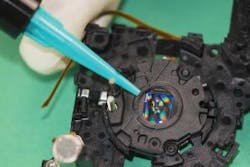NASA Low Outgassing Rated UV Curing Adhesive with High Glass Transition Temperature
Master Bond UV26 is a new one part UV curable system featuring an exceptionally high glass transition temperature (Tg) ranging from 160 to 170°C. This NASA low outgassing certified compound also offers strong adhesion to a wide variety of substrates such as glass, surface treated metals and many plastics. As a coating and adhesive it is also capable of withstanding harsh chemicals including acids, bases, fuels and many aggressive solvents.
This low viscosity compound (250-1,500 cps at 75°F) cures rapidly upon exposure to a UV light source at a wavelength of 320-365 nm with an energy output as low as 20-40 milliwatts per cm2. With a refractive index of 1.55 at room temperature, this system features outstanding optical clarity. UV26 offers robust physical strength properties upon curing and is ideal for high performance bonding and coating applications. It features low shrinkage upon curing and serviceability from -60°F to +500°F [-51°C to +260°C].
Master Bond UV26 is 100% solids, does not contain any solvents or volatiles and is not oxygen inhibited. It is available for purchase in 10 cc and 30 cc syringes, ½ pint and 1 pint containers. The shelf life at 75°F is 6 months in the original unopened containers.
